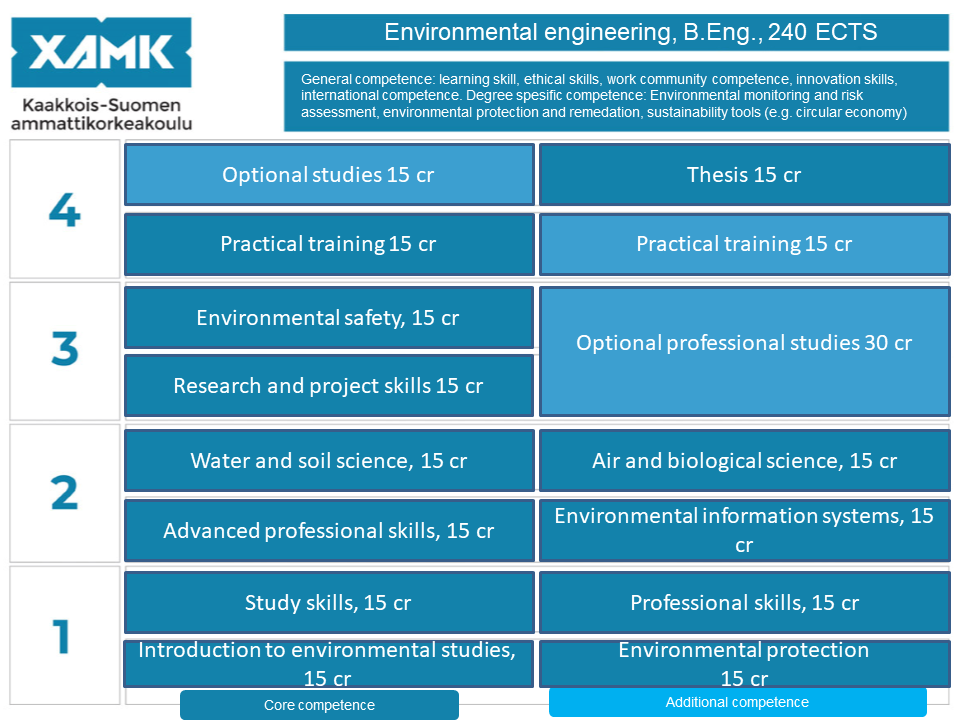Degree Programme in Environmental Engineering
- Degree
- Bachelor of Engineering
- Degree title
- Insinööri (AMK), Bachelor of Engineering
- Credits
- 240 ects
Objectives
MAKE THE FUTURE- TAKE A DEGREE IN ENVIRONMENTAL ENGINEERING
After graduation you can work in different positions of environmental research, supervision, planning and management. You may solve, improve and increase recycling solutions for cities, or conduct investigations and remediation actions in contaminated areas.
Other tasks could involve water and soil sampling, environmental monitoring, or you may plan and organize water acquisition and treatment processes. Your employers will be private companies, development agencies as well as research and development organizations.
There is an ever-growing need for environmental management and engineering expertise. Environmental technologies (green technologies, clean technologies) are among the most rapidly developing technology fields.
You could become a part of this field that needs internationally competent professionals for the future! And did you know that the education is free for EU/EEA students?
Degree programme description
The degree programme educates environmental professionals who are competent to apply environmental technology in their duties. The studies focus on sustainable environmental protection, environmental management and the best environmental technology and economics practices for organizations’ operations. They also involve various environmental technologies used for example in water acquisition and treatment and in cases of air pollution and contaminated soil.
Choosing a main subject or field of specialization
You can enhance your own professional orientation by Practical training (30 ECTS credits), Bachelor’s thesis (15 ECTS credits), Optional professional studies (30 ECTS credits) and by other Optional studies (15 ECTS credits).
Optional studies include for example courses in the following:
• Forestry
• Energy production
• Entrepreneurship studies
• Other environmental engineering related studies
You can create your own personal study plan in an electronic form which serves as a planning tool for the studies. The implementation is followed-up in cooperation with a Studies Coordinator.

Implementation of studies
This is a new way to complete degree studies. The courses mostly involve online learning. You only need to spend the second year of studies in Mikkeli, Finland. That second year has a very strong practical orientation; you take samples and carry out analyses working with real cases. After the second year, all the rest of your studies can be completed online. This makes it possible to study while working.
In addition, you have the opportunity to include exchange studies as part of your degree. This gives you a truly international degree. However, you are always able to complete your practical training and theses in your home country or home city, if you want.
In the beginning, the only thing you need is the motivation to study in the environmental field. We train you to be a professional.
Career opportunities
The field of environmental engineering is expanding and developing rapidly around the world for ensuring good living environment in the future.
You may develop and improve recycling solutions for cities or conduct investigations and remediation measures in contaminated areas. Other tasks could be water and soil sampling, environmental monitoring, or you may plan and organize water acquisition and treatment processes.
As a student, you develop skills you need to succeed in today's professions.
Environmental Engineering studies give you competence to work as a specialist in private companies, development agencies, associations and educational and research institutions. There is an ever-growing need for environmental management and engineering expertise.
Professional positions are, for example, the following:
• consultant
• quality manager
• environmental advisor
• environmental manager
• environmental planning officer
• environmental protection assistant
• environmental specialist
• environmental supervisor
• instructor
• planning, research or development engineer
• project engineer
RDI and cooperation with world of work
The Degree Programme in Environmental Engineering collaborates intensively with the economic life of the region: key stakeholders include other educational institutions, development agencies, private companies and public administration organizations.
Research, development and innovation (RDI) projects are integrated into the studies. The projects can be regional, national or international larger scale projects, or small-scale projects which have been ordered by a single organization to be implemented on a certain course of the degree program.
As the program is international, the stakeholder network also involves organizations outside Xamk’s nearby region and Finland.
Research focus
Xamk’s research, development and innovation (RDI) activities aim at improving the conditions for regeneration, growth and entrepreneurship in the region.
The fields of expertise are Sustainable wellbeing, Materials technology and Environmental safety and Digital archiving and eServices.
Students of Environmental Engineering work, first of all, in the field of expertise of Materials Technology and Environmental Safety where intelligent systems are applied to industrial and municipal processes and to the optimization of their energy and material flows. The efficiency in managing environmental hazards, the treatment of waters and the use of forests are improved by developing digital measurement, modeling and monitoring technologies.
One purpose of the RDI activities is to offer practical training places and thesis topics for students. RDI laboratories are also used as learning environments.
Learning environments
At Xamk learning bases on the needs and problems of our environment, and therefore learning strongly bases on the production of new knowledge. The learning process is a combination of theory and practice where students can strengthen their own research and development skills. This expertise is needed in environmental engineering jobs, regardless of the employer.
Even though you are able to complete most of your studies through online studies, the second year of the studies is very practical. This means going to the field, taking samples, doing analyses and interpreting the results. In other words, we learn through real assignments. Our environmental laboratory is very important in that process. We can perform very sophisticated analyses and measurements with modern measuring equipment.
Environmental engineering, full-time studies
Timing plan:
Environmental engineering, full-time studies
Timing plan:
Environmental engineering, full-time studies
Timing plan:
Environmental engineering, full-time studies
Timing plan:
